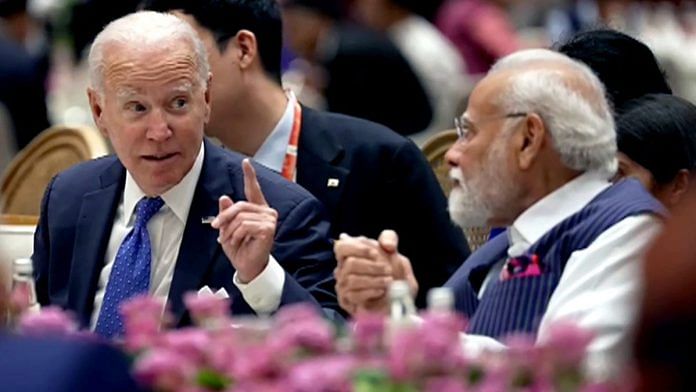India has had a tumultuous few months with accusations from Canada and the US. First, Canadian Prime Minister Justin Trudeau said the country was pursuing “credible allegations of a potential link between agents of the government of India and the killing of a Canadian citizen, Hardeep Singh Nijjar”. Two months later, the US accused India of being involved in the assassination attempt of US-Canadian citizen and ‘Khalistani’ separatist Gurpatwant Singh Pannun. India has denied any involvement in both events. Both these allegations come when India is seen as a crucial piece of the US-led China containment strategy. Chinese commentary about the issue is provocative; it expects a deterioration of relations.
When reports emerged indicating that Canada received intelligence from one of its Five Eyes allies—read the United States, it posed an unwelcome challenge, particularly considering the robust relationship between India and the US. Many posit that this partnership had strengthened due to growing concerns about China’s influence and potential threats. The emergence of the Indo-Pacific and the resurgence of the Quad have strategically positioned China at the epicentre of discussions, underscoring the critical importance of US alliances and partnerships in this region.
The visit of Federal Bureau of Investigation (FBI) director Christopher Wray to India on 11-12 December brought this friction to the forefront. It sparked considerable debate in India about the state of the India-US relations. But the overall trajectory of the partnership appears unlikely to suffer lasting damage.
However, China might anticipate a different outcome. As China endeavours to normalise ties with the US, there might be expectations that Washington recognises India as not entirely aligned with shared values.
Also Read: Biden’s focus was on Xi’s car, character. It shows the limits of success in US-China ties
How did China view this?
When Trudeau’s ‘credible allegations’ surfaced, a consensus emerged regarding the potential fallout between India and the West: Should India’s relations with the West deteriorate, the clear beneficiary would be China. A number of editorials were published by the Chinese state-owned media analysing the muted response from the US. One article by scholars from the China Institute of International Studies said, “Considering the realpolitik perspective, the US views India as a high-value partner in forming an anti-China coalition and is unwilling to openly criticize India. The core of current US foreign policy is focused on containing China and preserving US global hegemony, necessitating a conciliatory approach toward India.”
Another commentary highlighted that the West’s collective silence on the issue signals its double standard. “The collective silence of the West also reflected the deep imbalance of the alliance, where morality and rules hold no value unless it serves the US’ strategic interests. The issue has reflected the unequal nature of the US-centred alliance system, where allies exist only to fulfil the US’ own strategic interests, but never the other way around,” it read.
A significant topic of discussion on Chinese social media was India’s distinct approach to handling the situations involving the two countries, notably displaying a more cautious stance when dealing with the US.
Also Read: India’s trade deficit with China is so far lower in 2023 than last year. Here’s why
Can weaken Indo-Pacific partnerships?
The discourse surrounding the ‘Khalistani’ issue has misconstrued the essence of the India-US partnership in the Indo-Pacific region. The prevalent discussions often revolve around whether India would engage in a war alongside the US. However, it is crucial to recognise that no country, including India, would willingly enter into someone else’s conflict. Most countries involve themselves in conflicts only when their own interests are directly at risk.
The expectation is not to pressure India into supporting the US in a potential conflict with China. Rather, the US focuses on India as a means to deter and contain China, fostering trust and preparedness for a potential partnership if situations necessitate. Thus, risking relations with India over this would be exceedingly precarious for the US. This partnership is fostered on mutual strategic interests and shared concerns, and undermining it would not align with the broader objectives of deterring China and ensuring stability in the region. This becomes crucial, especially when Chinese commentary on the ‘Khalistani’ issue and India’s relations with the US tends to be provocative, anticipating a deterioration of relations.
On 2 December, US Commerce Secretary Gina Raimondo warned that “China is the biggest threat we’ve ever had and stressed the need for a larger budget for the Commerce Department’s Bureau of Industry and Security to outpace China’s technological innovation.” If the US is serious about dealing with the China challenge, it is time to put the ‘Khalistani’ issue to rest, address India’s concerns, and ensure this doesn’t jeopardise the progress achieved in recent years.
Sana Hashmi, PhD, is a fellow at the Taiwan-Asia Exchange Foundation and George H.W. Foundation for US-China Relations. She tweets @sanahashmi1. Views are personal.
(Edited by Theres Sudeep)



